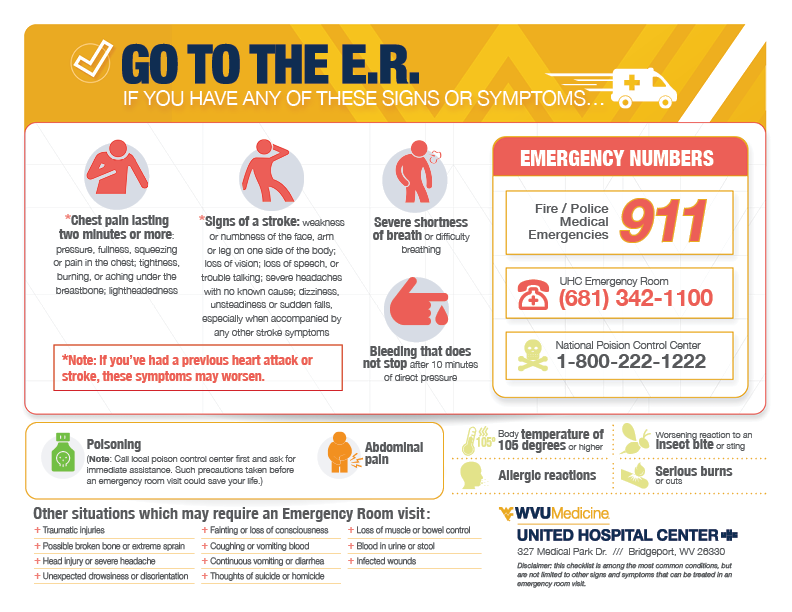Comprehensive emergency medical treatment and world-class healthcare
Just off I-79 and minutes from home.
Through these doors… is a specialized team of more than 150 board-certified physicians, hundreds of registered nurses and advanced therapists with access to state-of-the-art medical technology 24 hours a day, 7 days a week.
Through our commitment to continuous improvement, we’ve made significant investments in staff and facilities to shorten wait times in our emergency department.
Protect your family. Entrust their care to United Hospital Center.
When Should I Go To The ER?
It can be difficult to determine when injuries or illnesses are worthy of an emergency room visit. Sometimes a trip to the emergency room is necessary in order to get proper care.
Checklist of Conditions
Go to the ER if you have any of these signs or symptoms…
- *A heart attack lasting two minutes or more: pressure, fullness, squeezing or pain in the chest; tightness, burning, or aching under the breastbone; lightheadedness
- *Signs of a stroke: weakness or numbness of the face, arm or leg on one side of the body; loss of vision; loss of speech, or trouble talking; severe headaches with no known cause; dizziness, unsteadiness or sudden falls, especially when accompanied by any other stroke symptoms
- Severe shortness of breath or difficulty breathing
- Bleeding that does not stop after 10 minutes of direct pressure
- Abdominal pain
- Poisoning (Note: Call local poison control center first and ask for immediate assistance. Such precautions taken before an emergency room visit could save your life.)
- Allergic reaction
- Worsening reaction to an insect bite or sting
- Serious cuts or burns
- Body temperature of 105 degrees or higher
- Traumatic injuries
- Possible broken bone or extreme sprain
- Head injury or severe headache
- Unexpected drowsiness or disorientation
- Fainting or loss of consciousness
- Coughing or vomiting blood
- Continuous vomiting or diarrhea
- Thoughts of suicide or homicide
- Loss of muscle or bowel control
- Blood in urine or stool
- Infected wounds
Disclaimer: this checklist is among the most common conditions, but are not limited to other signs and symptoms that can be treated in an emergency room visit.
*Note: if you’ve had a previous heart attack or stroke, these symptoms may worsen.

